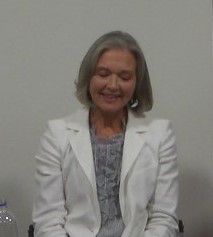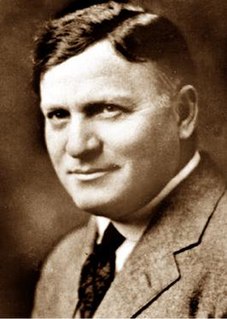A Quote by Anna Ford
The world men inhabit is rather bleak. It is a world full of doubt and confusion, where vulnerability must be hidden, not shared; where competition, not co-operation, is the order of the day; where men sacrifice the possibility of knowing their own children and sharing in their upbringing, for the sake of a job they may have chosen by chance, which may not suit them and which in many cases dominates their lives to the exclusion of much else.
Related Quotes
No man with a genius for legislation has appeared in America. They are rare in the history of the world. There are orators, politicians, and eloquent men, by the thousand; but the speaker has not yet opened his mouth to speak who is capable of settling the much-vexed questions of the day. We love eloquence for its own sake, and not for any truth which it may utter, or any heroism it may inspire. Our legislators have not yet learned the comparative value of free trade and of freedom, of union, and of rectitude, to a nation.
Further, the same Arguments which explode the Notion of Luck, may, on the other side, be useful in some Cases to establish a due comparison between Chance and Design: We may imagine Chance and Design to be, as it were, in Competition with each other, for the production of some sorts of Events, and may calculate what Probability there is, that those Events should be rather be owing to the one than to the other.
Our policy is to give all possible material aid to the nations that still resist aggression across the Atlantic and Pacific Oceans. And we make it abundantly clear that we intend to commit none of the fatal errors of appeasement. We have the thought that in this nation of many states we have found the way in which men of many racial origins may live together in peace. If the human race as a whole is to survive, the world must find a way by which men and nations may live together in peace. We cannot accept the doctrine that war must be forever a part of man's destiny.
Whatever else you do or forbear, impose upon yourself the task of happiness; and now and then abandon yourself to the joy of laughter. And however much you condemn the evil in the world, remember that the world is not all evil; that somewhere children are at play, as you yourself in the old days; that women still find joy in the stalwart hearts of men; And that men, treading with restless feet their many paths, may yet find refuge from the storms of the world in the cheerful house of love.
It may be seriously questioned whether the philosophies... which isolate mind and set it over against the world did not have their origin in the fact that the reflective or theoretical class of men elaborated a large stock of ideas which social conditions did not allow them to act upon and test. Consequently men were thrown back into their own thoughts as ends in themselves.
The essence of that by which Jesus overcame the world was not suffering, but obedience. Yes, men may puzzle themselves and their hearers over the question where the power of the life of Jesus and the death of Jesus lay; but the soul of the Christian always knows that it lay in the obedience of Christ. He was determined at every sacrifice to do His Father's will. Let us remember that; and the power of Christ's sacrifice may enter into us, and some little share of the redemption of the world may come through us, as the great work came through Him.
To some it may seem old-fashioned to speak of virtue and chastity, honesty, morality, faith, character, but these are the qualities which have built great men and women and point the way by which one may find happiness in the living of today and eternal joy in the world to come. These are the qualities which are the anchors to our lives, in spite of the trials, the tragedies, the pestilences, and the cruelties of war which bring in their wake appalling destruction, hunger, and bloodshed
I define vulnerability as uncertainty, risk and emotional exposure. With that definition in mind, let’s think about love. Waking up every day and loving someone who may or may not love us back, whose safety we can’t ensure, who may stay in our lives or may leave without a moment’s notice, who may be loyal to the day they die or betray us tomorrow—that’s vulnerability.
Our lives can be considered a sacred quest. It is a quest which may have begun in this lifetime or many lifetimes before. It is a quest to find ourselves: who and what we really are. To do this we must first cease to pretend to be what we are not. We must cast away our Persona or mask. We must be prepared to confront the Shadow, that which we are and rather were not. Only then can we unify our conscious and unconscious minds and so give birth to the hidden Sun - the Self.
Aestheticism and radicalism must lead us to jettison reason, and to replace it by a desperate hope for political miracles. This irrational attitude which springs from intoxication with dreams of a beautiful world is what I call Romanticism. It may seek its heavenly city in the past or in the future; it may preach 'back to nature' or 'forward to a world of love and beauty'; but its appeal is always to our emotions rather than to reason. Even with the best intentions of making heaven on earth it only succeeds in making it a hell - that hell which man alone prepares for his fellow-men.
Theology, by diverting the attention of men from this life to another, and by endeavoring to coerce all men into one religion, constantly preaching that this world is full of misery, but the next world would be beautiful - or not, as the case may be - has forced on men the thought of fear where otherwise there might have been the happy abandon of nature.
The sum is, that the worship of God must be spiritual, in order that it may correspond with His nature. For although Moses only speaks of idolatry, yet there is no doubt but that by synecdoche, as in all the rest of the law, he condemns all fictitious services which men in their ingenuity have invented.
But as the old Confusion of tongues was laudable, when men who were of one language in wickedness and impiety, even as some now venture to be, were building the Tower; for by the confusion of their language the unity of their intention was broken up, and their undertaking destroyed; so much more worthy of praise is the present miraculous one. For being poured from One Spirit upon many men, it brings them again into harmony. And there is a diversity of Gifts, which stands in need of yet another Gift to discern which is the best, where all are praiseworthy.
The full meaning of a language is never translatable into another. We may speak several languages but one of them always remains the one in which we live. In order completely to assimilate a language it would be necessary to make the world which it expresses one's own and one never does belong to two worlds at once.

































